[This fragment is available in an audio version.]
What happened was, I was listening to an (at least) fifty-year old LP, a classical collection entitled The Virtuoso Oboe; it’s what the title says. The music was nothing to write home about but led into a maze of twisty little passages that ended with me admiring the life of a glamorous Russian bisexual Jewish ballerina heiress who’s famous for… well, we’ll get to that.
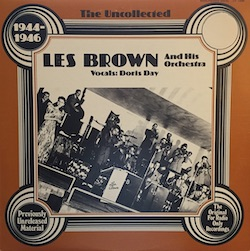
Regular readers know that I have a background task — working through an inherited trove of 900 mostly-classical LPs. In that piece I said I was going to blog my way through the collection but I haven’t, which is probably OK. But tonight’s an exception.
Oboe virtuosity · As the picture linked above reveals, the records are in cardboard liquor boxes, and somewhat clustered thematically. The box I’m currently traversing seems to be mostly “weird old shit, mostly bad, mostly scratchy”. It contained some malodorous “easy listening” products of the Fifties and Sixties. (I kept one, 1944-46 recordings by Les Brown’s extremely white jazz band, forgettable except it has Doris Day on vocals and let me tell ya, she sets the place on fire. But I digress.)
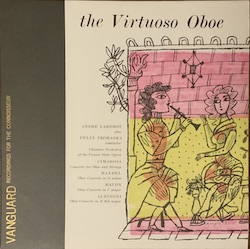
Anyhow, last night’s handful of LPs to wash and dry and try included The Virtuoso Oboe and The Virtuoso Oboe Vol. 4, whose existence suggests the series had legs. It features that famous household name André Lardrot on, well, oboe.
The first record contained music from Cimarosa, Albinoni, Handel, and Haydn and frankly didn’t do anything for me. None of the tunes were that memorable and I didn’t find the oboe-playing compelling. So it’s going off to the Sally Ann.
I questioned whether Vol. 4 was even worth trying, but then I noticed it had a concerto by Antonio Salieri. Who’s got Salieri in their collection, I ask you? Nobody, that’s who! But now I do.
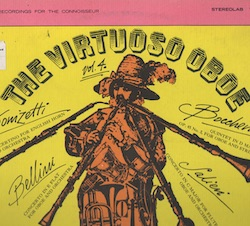
The concerto is nice; if you told me it was by Mozart I’d believe you. A couple of the melodies are very strong and skip opportunities for convolutions and decorations that W. Amadeus never would have.
On the other side was a Concertino for English Horn by Donizetti. I vaguely remembered that the English Horn (a.k.a. cor anglais) is sort of like an oboe only bigger, and notably neither English nor a horn.
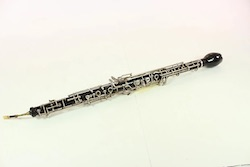
While I was reading up on that I discovered the Oboe d’amore, which is bigger than an oboe but smaller than a cor anglais. Who could resist learning more about a love oboe? Whereupon I learned that it’s perhaps most famous for leading one of the stanzas in Ravel’s Boléro. At which point I was about to stop, because what more can be said about the Boléro?
Well, lots! I’d somehow internalized it as fact that Ravel hated his most famous work and regretted writing it, but not so. He attended performances and produced a later arrangement for two pianos. He also expressed the perfectly reasonable opinion that once he’d done it, nobody else needed to write any pieces consisting of a single melodic line repeated over and over again for seventeen minutes and successively enhanced by adding more and more instruments playing louder and louder.
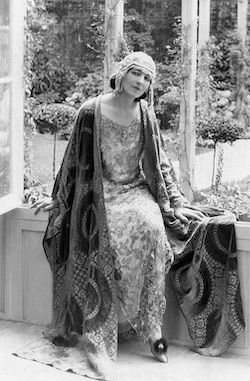
He also thought it should be played at a steady pace and got into a big public pissing match with Toscanini, who wanted to play the piece not only louder and louder but faster and faster.
I was thinking about the Oboe d’Amore and Boléro and speculated that might be a joke to be found along the lines of oBo d’Erek but you’d have to be over fifty to follow the thread and anyhow I was wrong, there isn’t a joke there.
Ida Rubinstein · Wait, there’s more! It turns out that Ravel didn’t write the Boléro just because he felt like it, but because he was paid for it; a commission from one Ida Rubinstein, mentioned at the top: dancer, Russian, heiress, bisexual, etc. The reason I wrote this was to get you to hop over to Wikipedia and read up about her life, which was extraordinary. Having done that, you can actually watch bad silent film of her dancing, someone having supplied a music track. It’s a pity there’s no video of her performing to Boléro.
My work here is done.
Comment feed for ongoing:
From: David Huberman (Jun 27 2020, at 17:58)
Two comments jump out for me:
- Debussy wrote some absolutely beautiful passages for english horn in a lot of his pieces, including prelude to the afternoon of a faun, and le mer. It's a truly lovely instrument, and when properly composed for, its tone absolutely soars.
- Not intentionally staying in France, but I assume you're familiar with Francis Poulenc's sonata for oboe and piano? If anything will make you want to pick up your oboe and practice, I think it's Poulenc. (And it's Poulenc, so the melody will occasionally go to weird places before returning to where you want it to.)
[link]